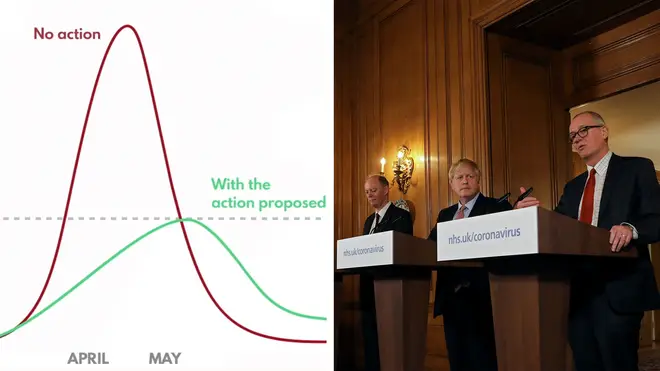
Clive Bull 2am - 4am
13 March 2020, 16:19 | Updated: 7 June 2023, 08:56
The UK has taken a very different approach than most other countries to combating coronavirus. LBC explains the thinking behind the Prime Minister's strategy.
Boris Johnson's plan is to create a "herd immunity" to coronavirus, meaning that if a wide number of low-risk people get the virus, it will be harder to spread further later down the line.
So what is the difference between the UK's approach and other European countries, who have closed schools and put in travel restrictions.
LBC's Ben Kentish explains the science behind the UK's coronavirus strategy.
"Boris Johnson was adamant yesterday that he is confident he has taken the right approach - as was the Chief Medical Officer and the Chief Scientific Adviser.
"It's a very different approach to almost all the UK's allies, with other western democracies going for stricter measures immediately.
"But they are confident that their modelling and their science shows that ultimately a lot of those measures are pointless. It's a risky decision, because it does put the UK out on a limb, but it's based on two fundamental predictions.
READ MORE: When should you self-isolate? Get the official advice

"The first is quite a pessimistic one: this virus is going to spread, however hard you try to contain it. So having drastic measures with huge social costs such as closing schools is ultimately pointless because it's going to spread anyway.
"The second reason is a bit more counter-intuitive: that the spread of the virus could be advantageous. The Chief Scientific Advisor said yesterday that in a way, the government wants this to spread across the population.
"Because the other downside of those strict measures that other countries have taken is that the evidence suggests as soon as those restrictions have lifted, the virus comes back.
"Whereas, the UK's approach says that the more people who get it now, the more we can spread it out, the more resilient the population will be if this virus comes back in the winter.
"Essentially, it's a riskier approach but it's also a more long-term approach.
"The are saying they think countries like South Korea that have taken strong measures will get a second shock in the winter if this comes back.
"So more people may be affected early on, but the thinking is that this will help us later down the line."